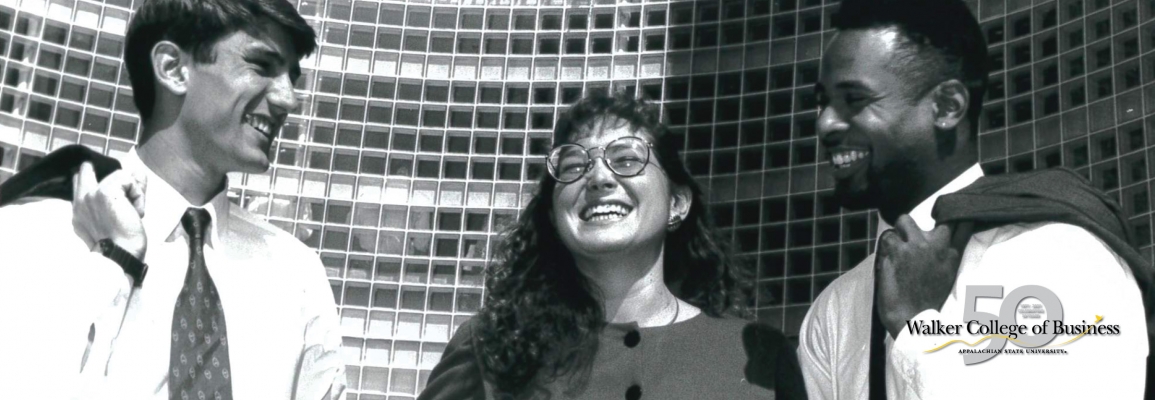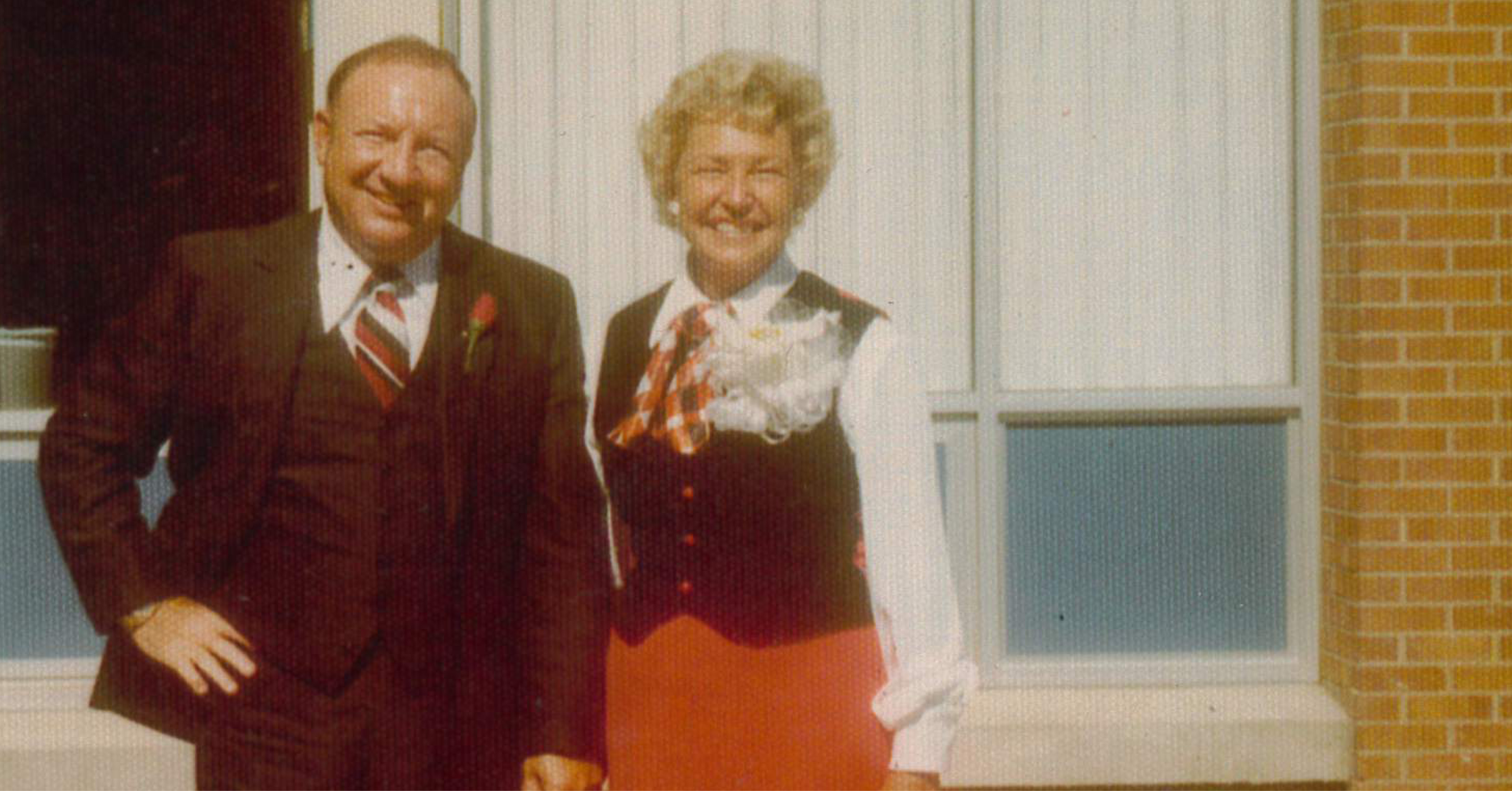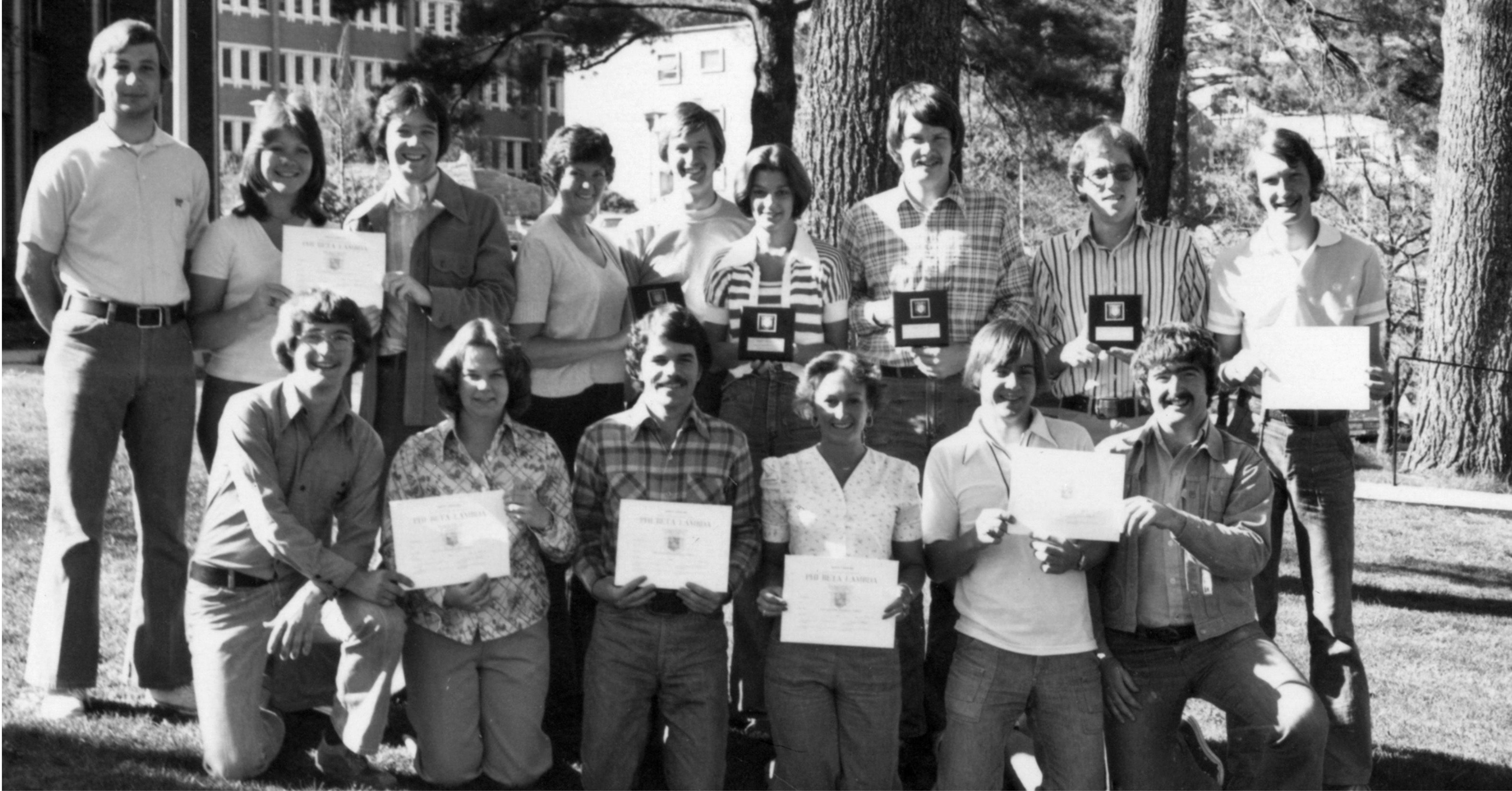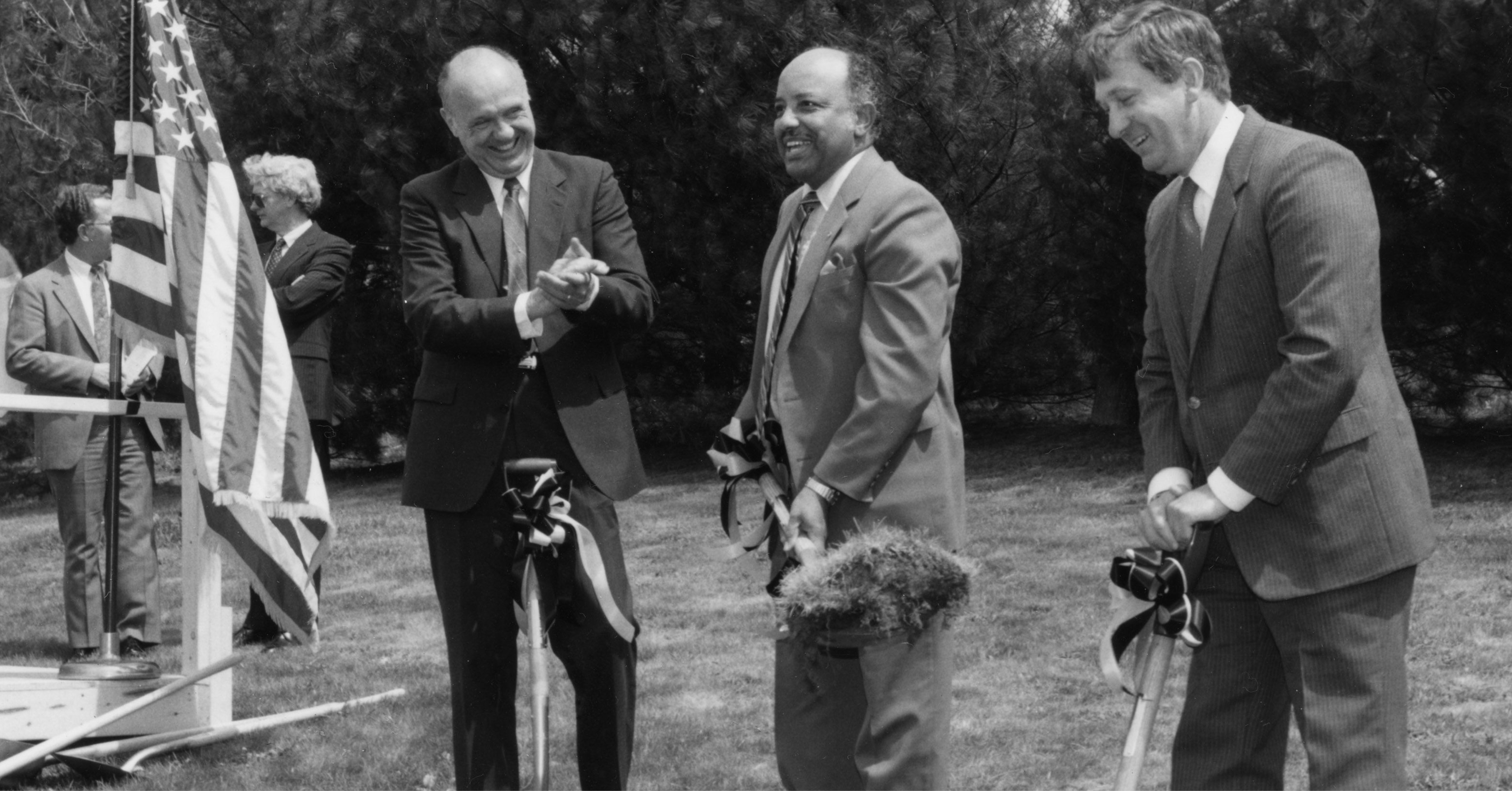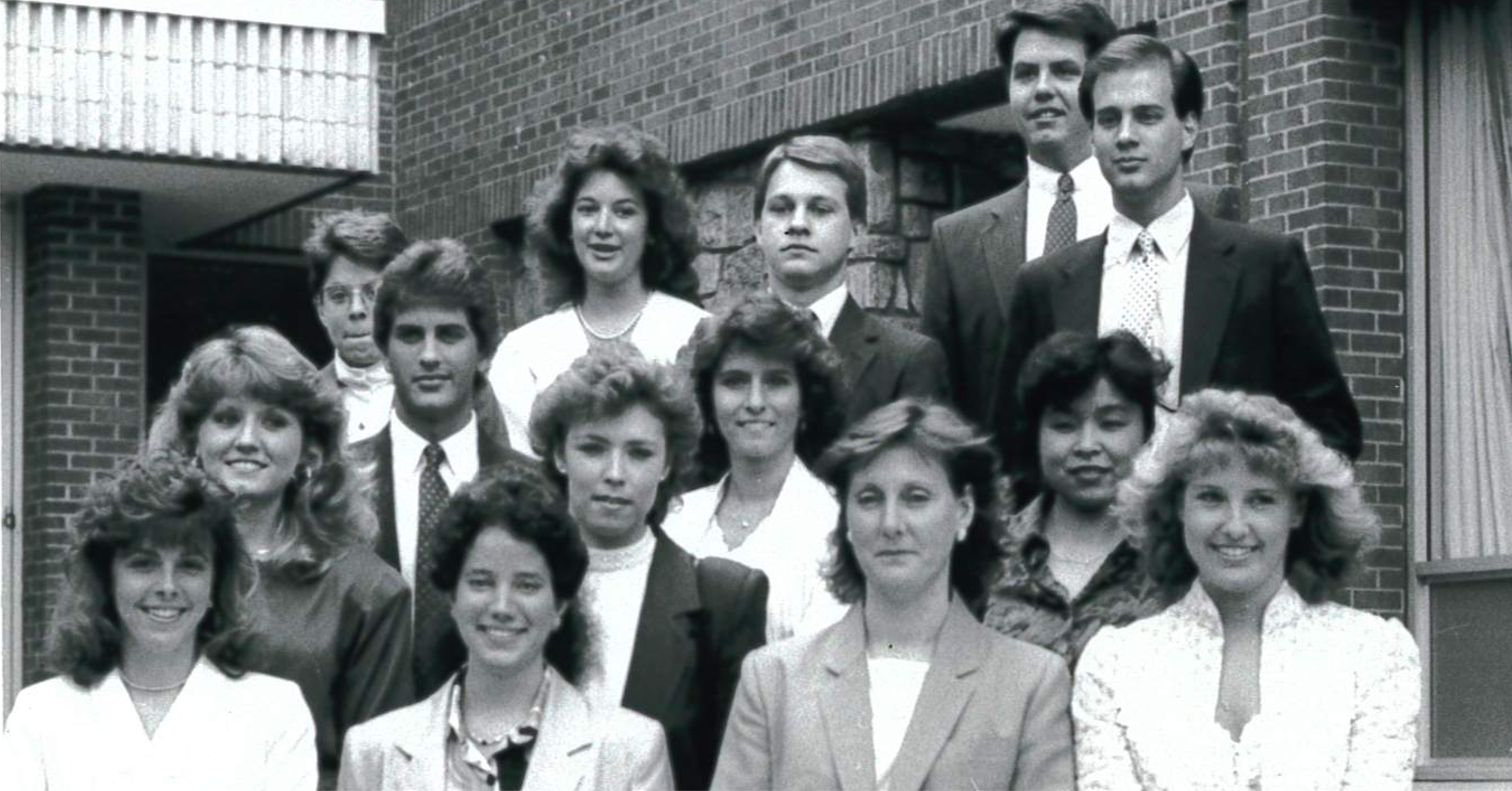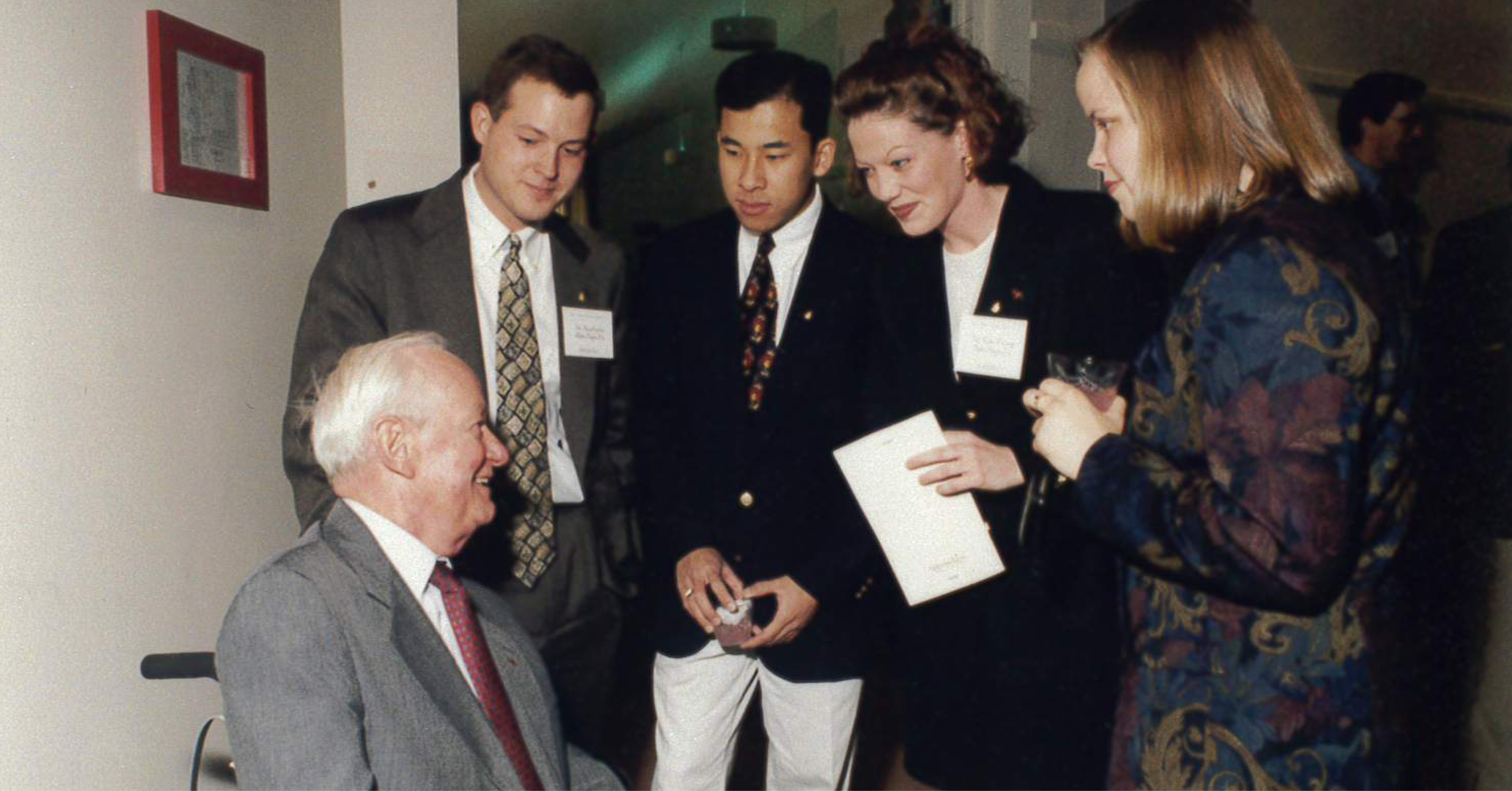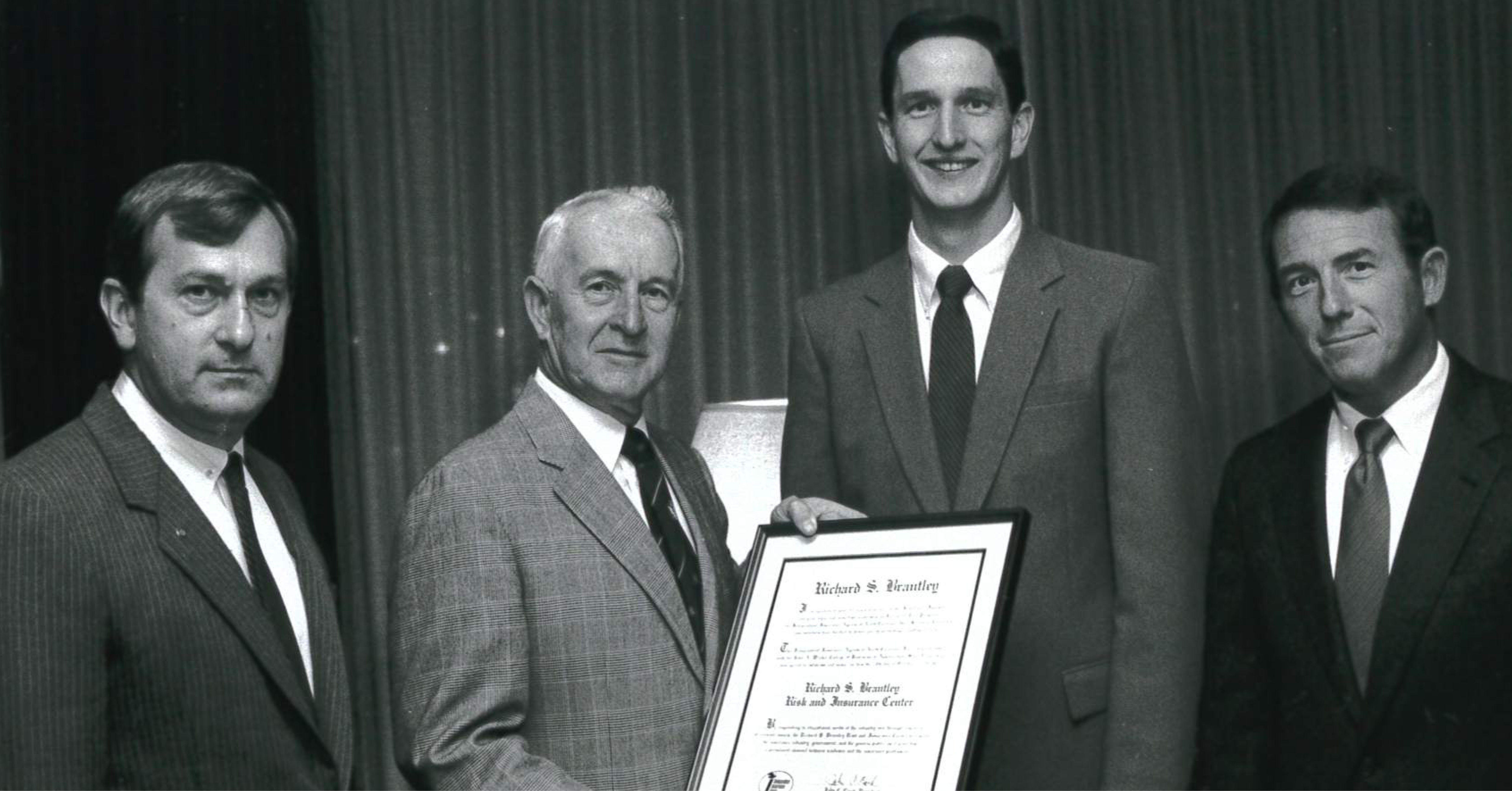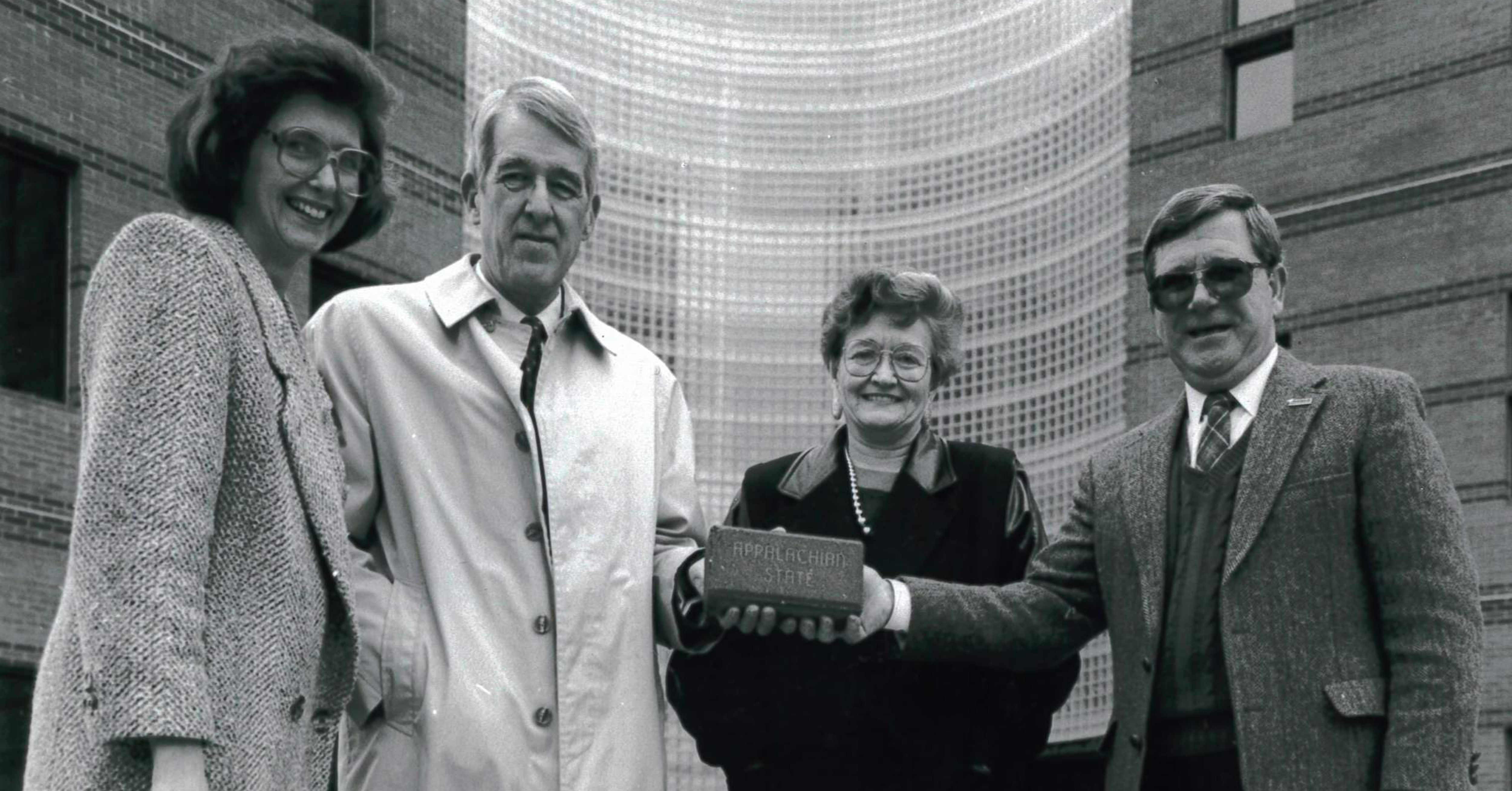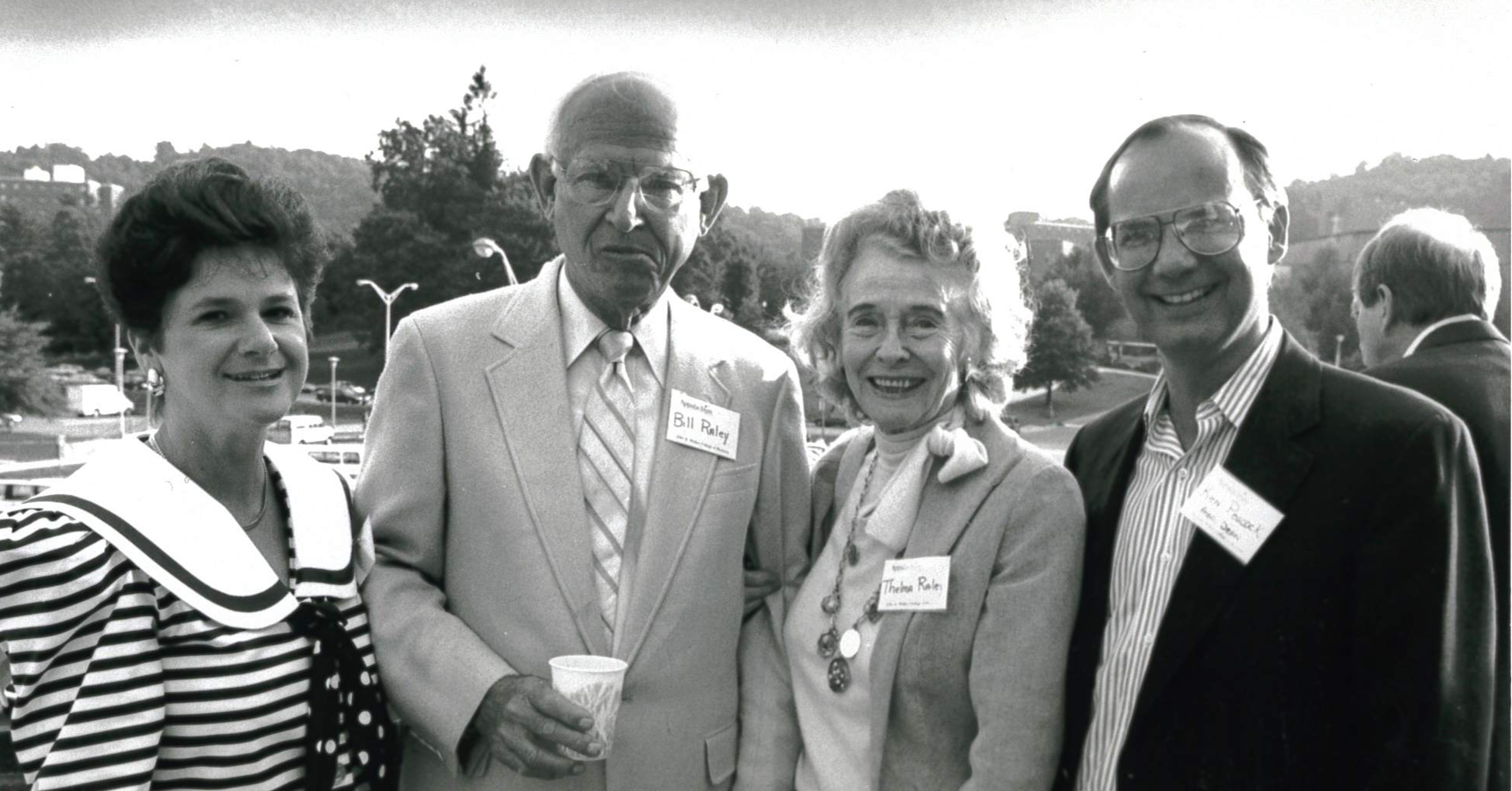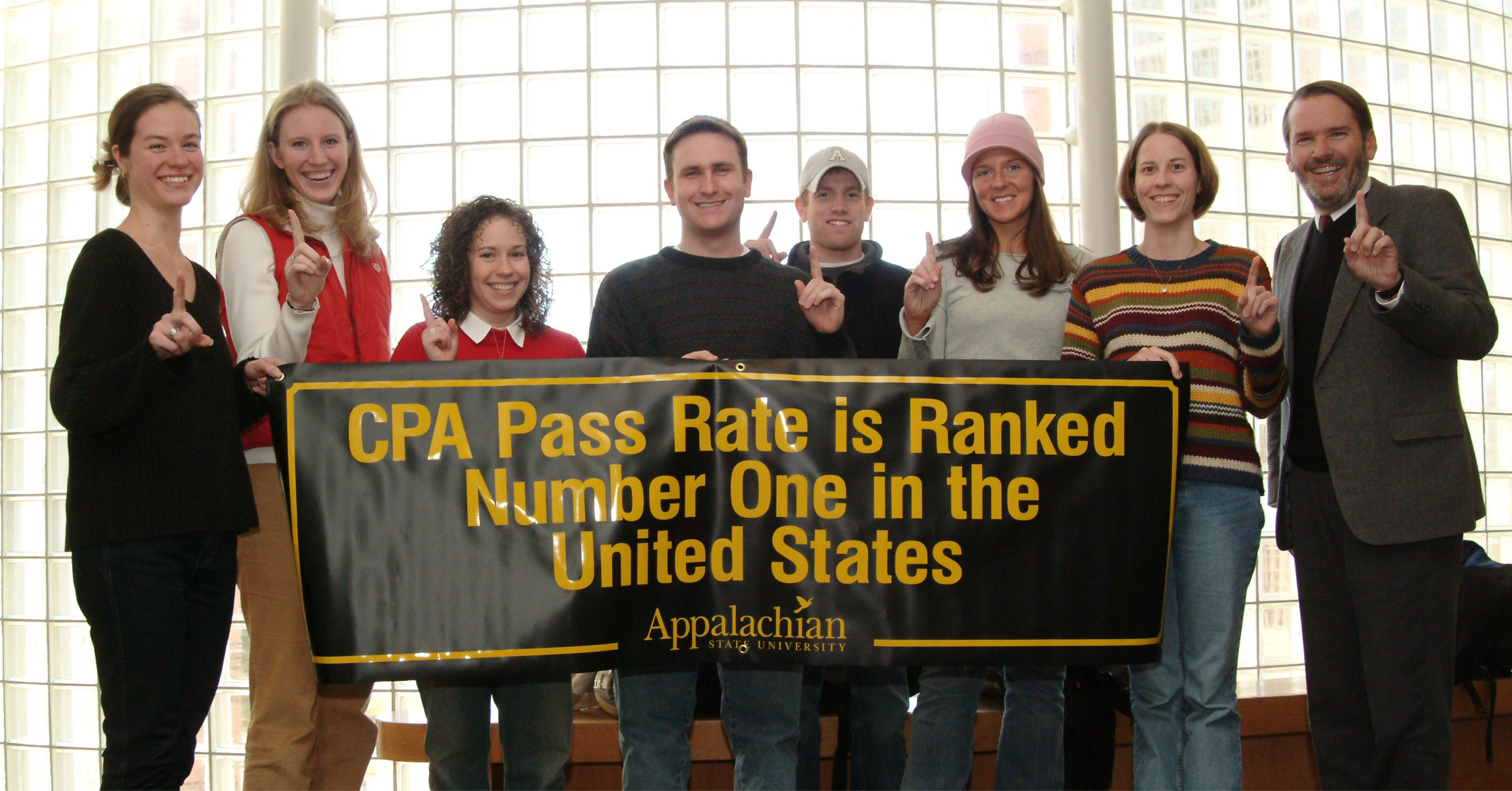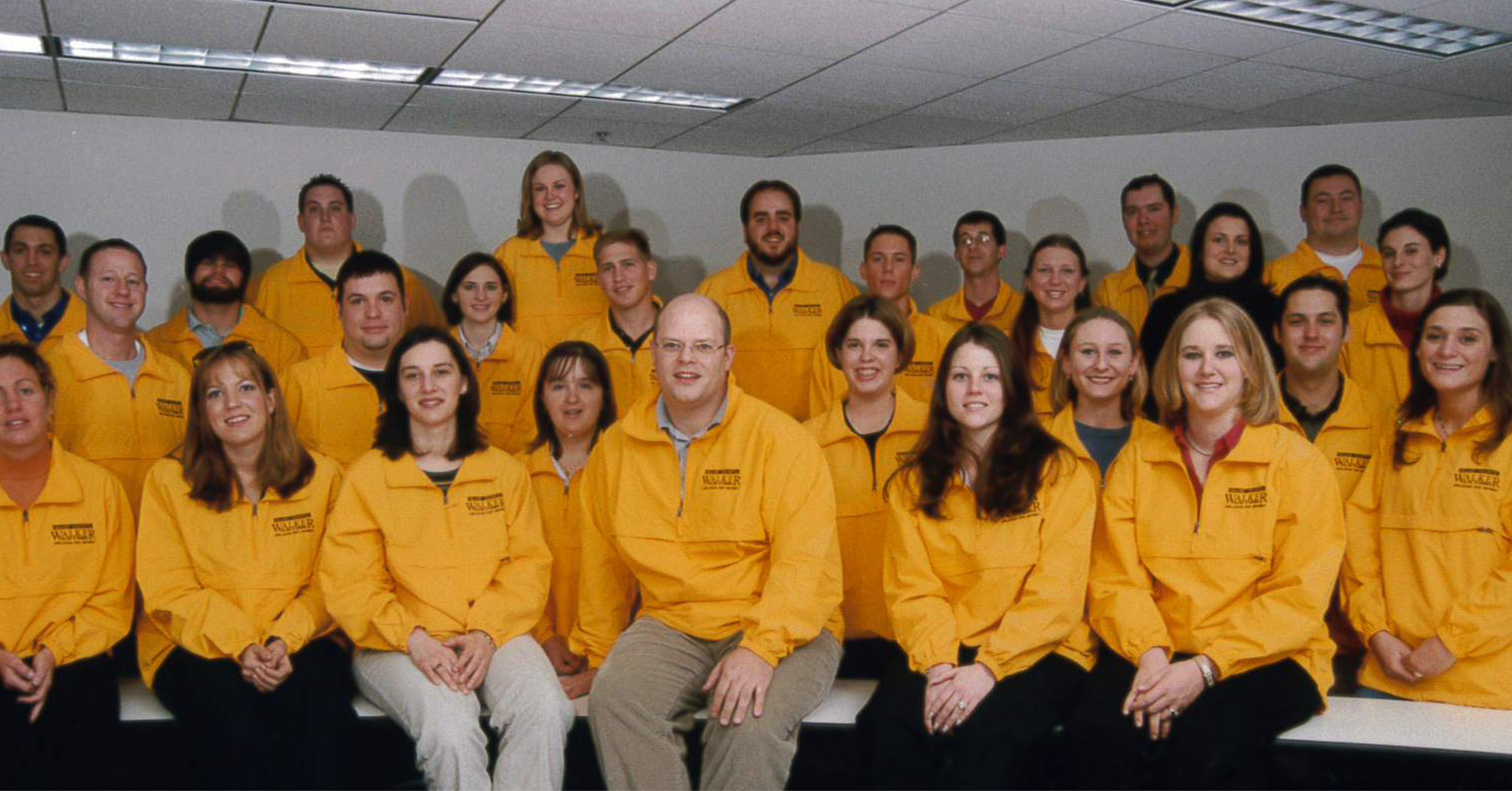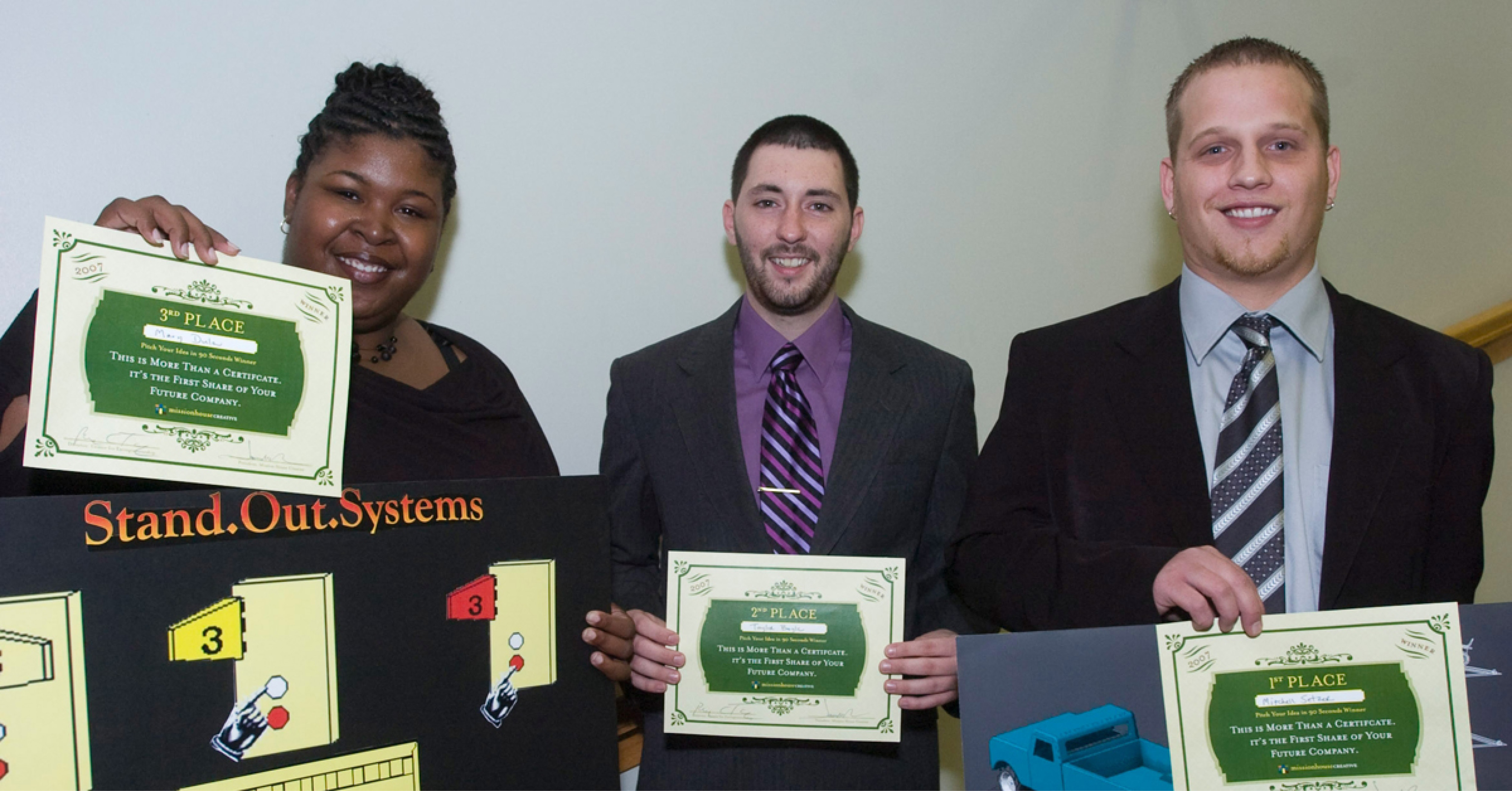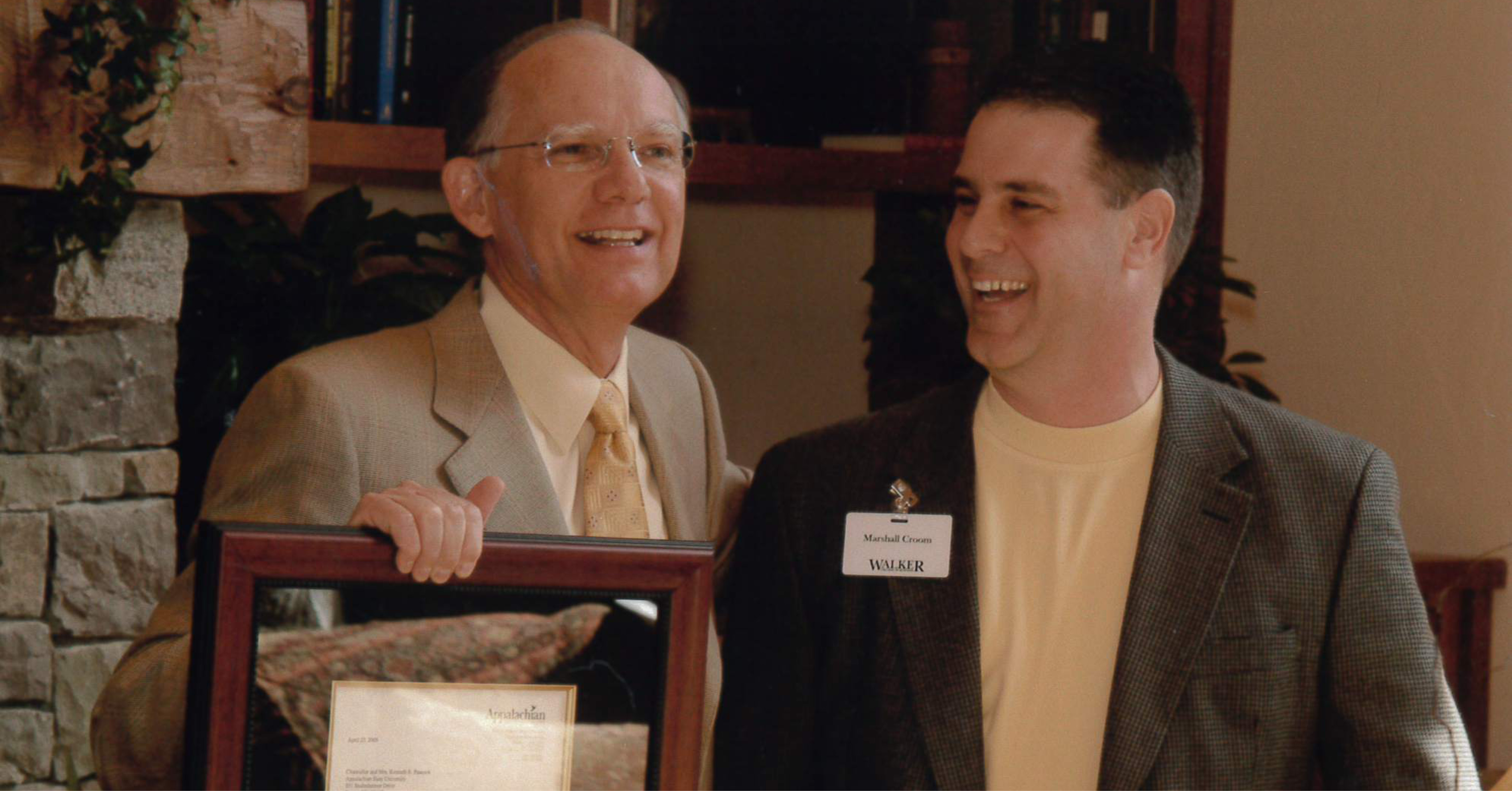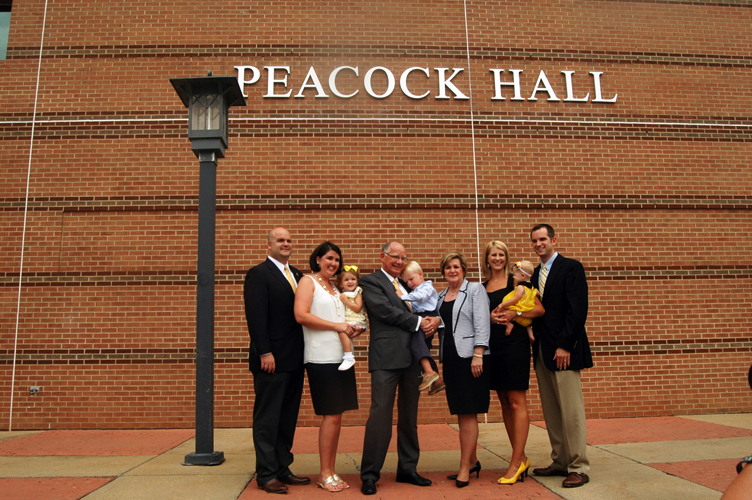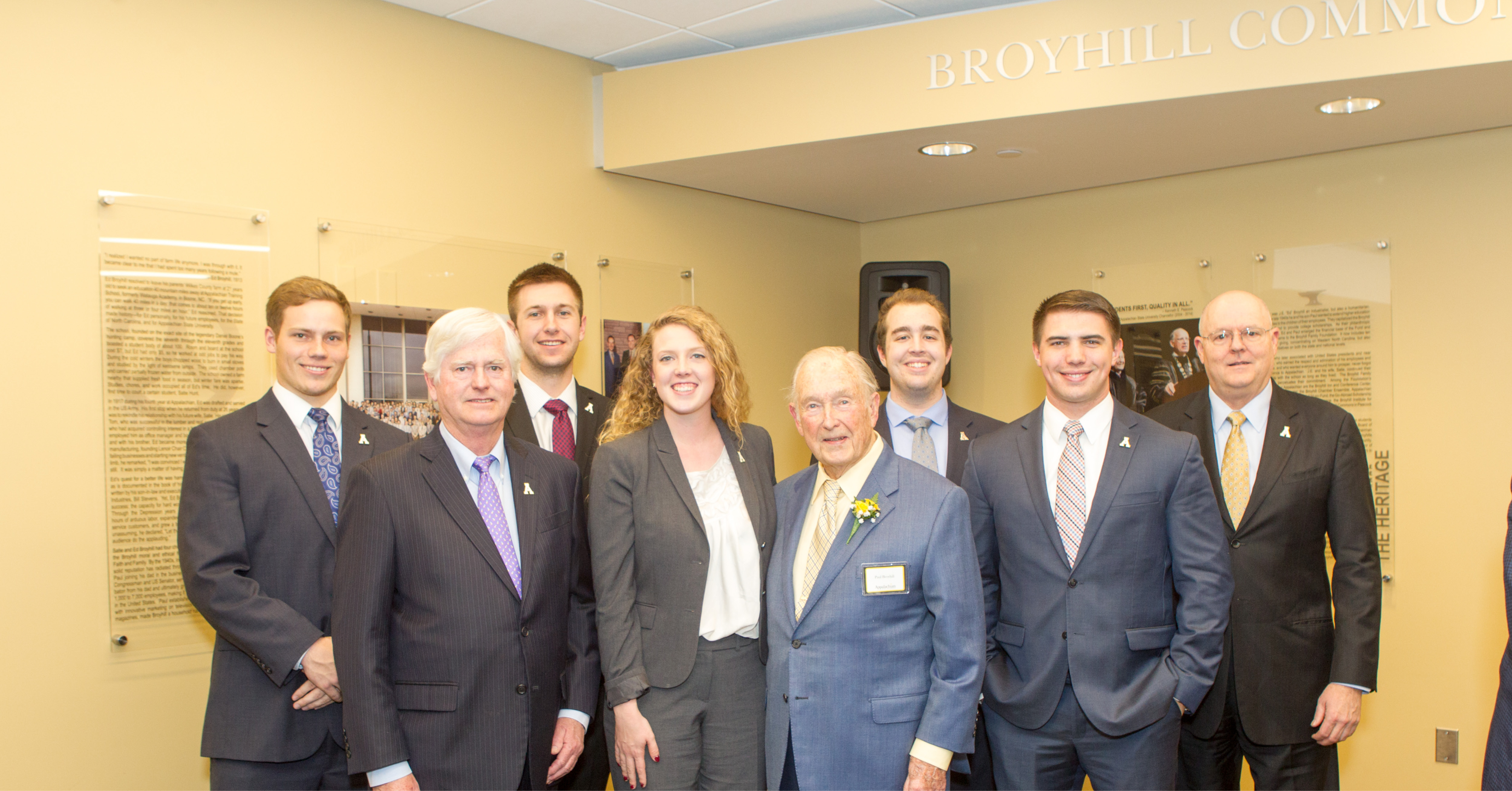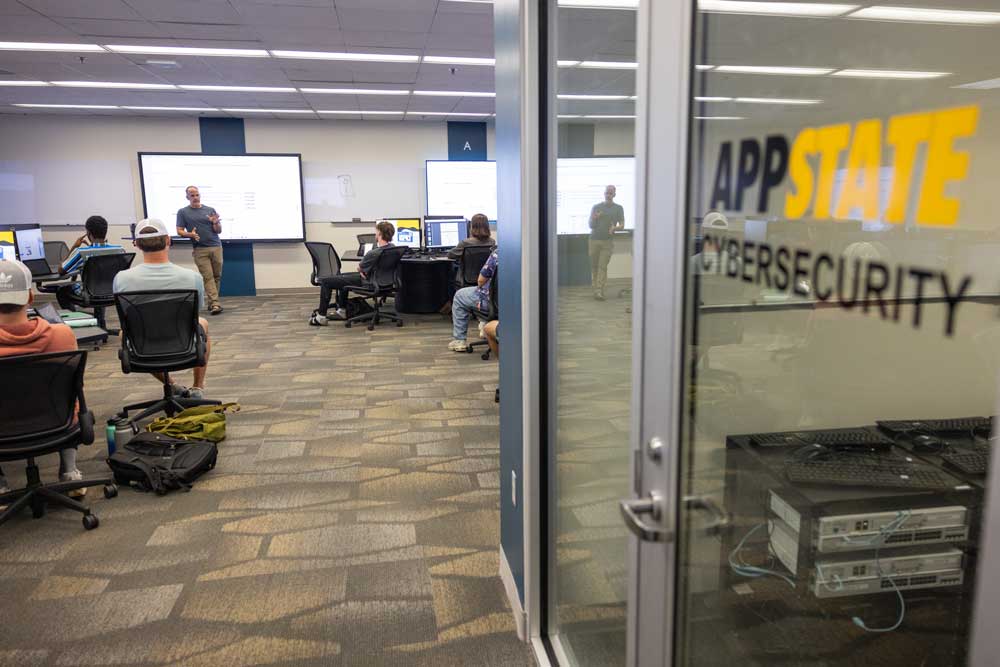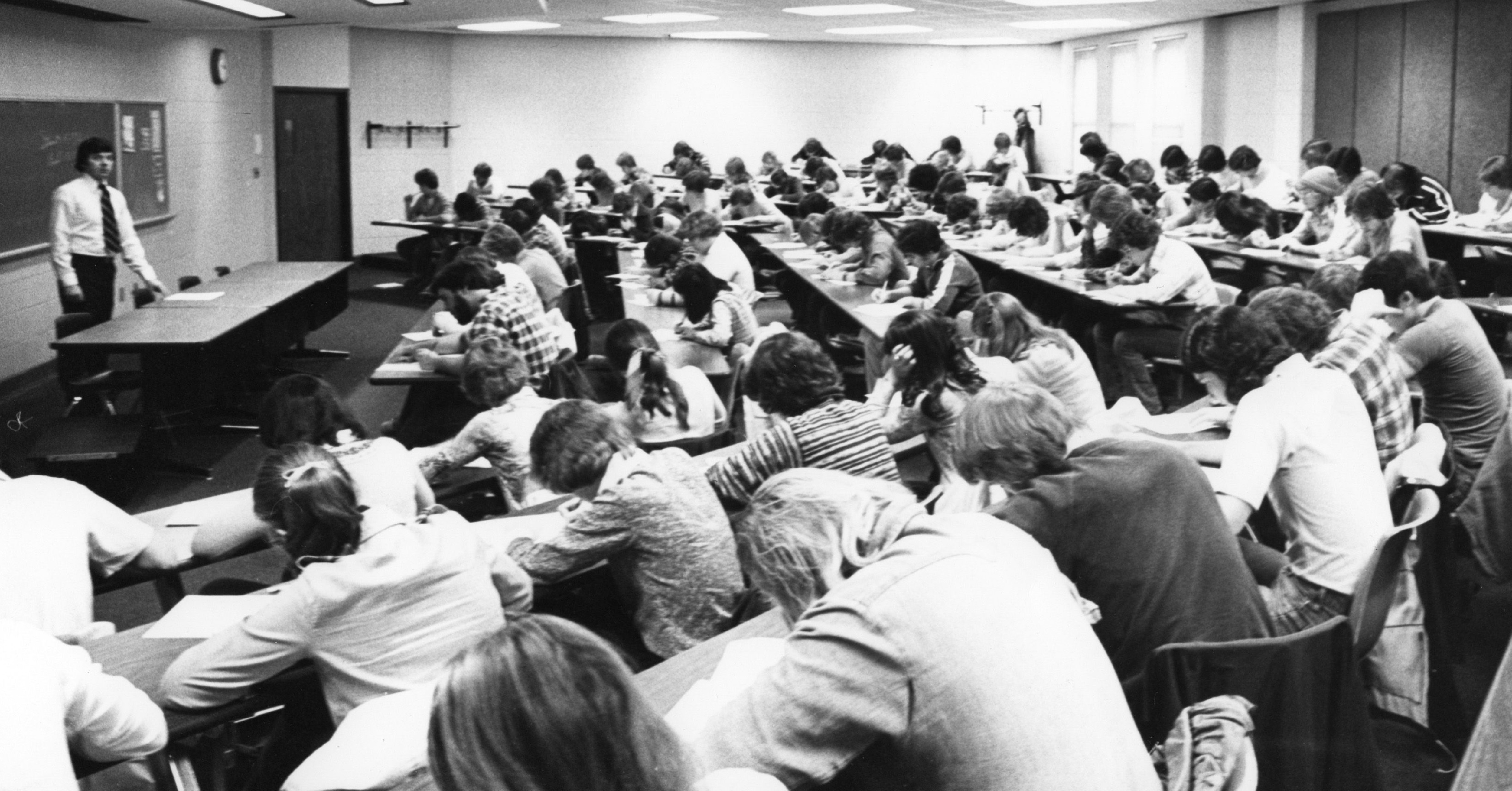
Walker College of Business Historical Timeline
This timeline is a living document and a work in progress. Please email contributions or corrections to wcob@appstate.edu.
Appalachian State University began as Watauga Academy, founded in 1899 by Dr. B.B. Dougherty, his brother D.D. Dougherty, and D.D.’s wife, Lillie Shull Dougherty. They shared the dream of helping children in North Carolina’s “lost provinces” discover educational opportunity to match the splendor of the mountains in which they lived. This tiny academy quickly evolved into a school preparing quality teachers to serve our state and beyond. Building on this strong foundation, Appalachian grew into a destination of choice for high-achieving, intellectually curious students wanting to be engaged in the community.
Known as one of North Carolina’s greatest educators, B.B. Dougherty led the institution for 56 years – from its humble beginnings as Watauga Academy to Appalachian Training School for Teachers, the two-year Appalachian State Normal School and later the four-year Appalachian State Teachers College. The pioneering spirit necessary to overcome the area’s isolation and hardships quickly characterized the institution, giving Appalachian its special niche in higher education.
Watauga Academy becomes a state institution and the name changed to Appalachian Training School, granting two year degrees.
Education in business was seen as a need from the very early years.
- In 1906, the first courses in bookkeeping, business transactions, and economics were offered using Ely and Wicker’s Economics.
- In 1912, the first course in business using Teller and Brown’s A First Book in Business Methods would be offered.
- In 1913, a .5 unit course in business topics would become required for graduation.
- In 1929, the Principles of Economics course in the senior year would be required to graduate.
- By 1931, four courses in economics would be offered by the Department of History and Social Sciences.
- By 1942, seven courses in business and economics would be offered through the Department of Social Science including topics such as labor and finance, consumer economics, taxation, and personal finance.
Appalachian Training School was renamed Appalachian Normal School, but maintained a two year curriculum dedicated to teaching degrees.
- Appalachian Normal School became a four-year, degree granting institution named Appalachian State Teachers' College. Only teaching degrees were granted.
Edith Hess, the first Business Education faculty member is hired.
Business Education is offered as a major.
Appalachian State Teachers' College was authorized to grant master’s degrees. Graduate courses had been offered at Appalachian State Teachers' College since 1943.
- In 1955, Dr. J.D. Rankin became Interim President of Appalachian State Teachers’ College.
- Later that year, Dr. William H. Plemmons became President of Appalachian State Teachers’ College, a role he held until 1969 when he was succeeded by Dr. Herbert W. Wey. Plemmons presided over Appalachian’s transformation from a single-purpose teachers college into a multipurpose regional university. Yet, the precious features that set Appalachian apart – quality teacher training and a commitment to community spirit, faculty collegiality, and a beautiful mountain setting – remained secure under his leadership. Known as the builder president, Plemmons oversaw 25 construction projects and strengthened the Appalachian spirit through enhanced activities for students and alumni, creating an interconnected community called the Appalachian Family. When fire destroyed the administration building in 1966, it symbolized the demise of the old Appalachian and birth of the new. Enrollment exceeded 2,400 by 1958, only to double within 10 years. Full-time faculty grew to more than 300 and became more diverse. During his tenure, Appalachian also began offering master’s-level programs.
- While Appalachian Training School came under the regulatory control of the State Board of Education in 1921, it was a 1957 change in N.C. Legislation recognized the teaching of liberal arts at Appalachian Teacher College as part of a statewide expansion of higher education.
- Later, In 1972, Appalachian will merge into the 16 campus UNC System and a State Board of Governors will be established.
The purpose of the school was expanded from a mission only to prepare teachers and staff in education. The new catalog now read "Appalachian provides an opportunity for students to acquire a liberal education ...and to prepare for teaching, school administration, and other professional careers and public services." Appalachian for the first time offered B.A. and B.S. degrees without teacher certifications.
- In 1966, a Department of Economics and Business is created, with Dr. Orus R. Sutton serving as chair.
- A data processing course is added to the curriculum.
- In 1967, the Department of Business and Economics, soon to be part of the College of Fine and Applied Arts, had experienced enormous growth, with 532 undergraduate students and 33 graduate students -- more than half in the non-teaching program.
- By 1968, a total of 167 degrees Economics and Business degrees have been awarded.
- In 1967, Appalachian State Teachers’ College (ASTC) designated a “regional university” and the name changed to Appalachian State University.
- The Economics and Business Department completed a curriculum benchmarking study of business programs at 86 university members of the American Association of Collegiate Schools of Business (AACSB).
- The Business Administration program which was a major in the Economics and Business Department grew very rapidly. Students could select a field of emphasis from Accounting, Economics, Finance and Insurance, Management, Marketing and Merchanclising, or Secretarial Administration.
- Members of the faculty working as special committees duplicated recommended degree programs for each of the emphases areas consistent with the recommendations of the American Association of Collegiate Business Schools.
- Four new colleges at the University are established: General College, the College of Arts and Sciences (CAS), the College of Fine and Applied Arts (CF&AA) and the College of Education (COE). The Department of Economics and Business was assigned to the CF&AA.
- Department of Economics and Business in the College of Fine and Applied Arts began offering a B.S. in Business Administration. The department had 650 students and 17 faculty members, and became very active in Phi Beta Lambda, the collegiate student club for Future Business Leaders of America.
- Appalachian State University provost position was created.
- An institutional long range plan was initiated, and the Appalachian President, Provost and Director of Business Affairs consulted with business and industrial leaders to secure financial support for the planned new college of business.
- The Appalachian trustees approve moving forward with the college of business.
- In 1969-1970, the Economics and Business Department rewrote syllabi for existing courses and developed syllabi for new courses to support planned new business degree programs.
Dr. Herbert W. Wey is named president and later chancellor, in 1971. The university became part of the University of North Carolina system in 1971 under the leadership of Dr. Wey (1969-79). He introduced innovations that earned Appalachian national recognition as an institution of change, all while enrollment doubled to about 9,500. Under his leadership, Appalachian implemented the student teacher program, College of Business, continuing education program and Watauga College, a small residential college within the greater university. It also secured the New York Loft and App House in Washington, D.C., for off-campus scholarly activities. To ensure the university’s continued innovation and success, Wey created the Appalachian State University Foundation Inc. to solicit support from individuals, corporations and businesses. Wey was a prolific writer and researcher. Peers referred to him as the “educational innovator” for encouraging faculty to develop and practice new theories of teaching and learning.
Dr. William V. Muse is named first Dean of the College of Business in April 1970.
- On July 1, 1970, the College of Business began with one department, Department of Economics and Business, which moved from the College of Fine and Applied Arts.
- The BSBA in Business Administration and BSBA in Business with a concentration in Economics were offered.
- The first Business Advisory Council with 42 executives was held in July.
- The College of Business joined the American Association for Collegiate Schools of Business (later AACSB) in November.
Four departments were formed: Accounting; Business Administration; Business, Economic, and Occupational Education; and Economics.
- BSBA degrees in Economics, General Business, Finance and Banking, and Marketing and BA in Economics were offered. The BA degree in Economics moved to the College of Arts and Sciences in 1974, and back to the Walker College of Business in 2011.
- Appalachian was merged into the 16 campus UNC System. The State Board of Governors was created, and Appalachian's Board of Trustees responsibilities were revised.
- The Bureau of Economic and Business Research was created in the College of Business.
- The first Appalachian Business Review was published.
- The college occupied all of Smith-Wright Hall.
This image shows a class taught in the College of Business at Appalachian State University (1967-current) in the 1970s. A professor can be seen standing behind a desk on the left and students can be seen sitting at desks, writing, on the right. The College of Business was established in 1970-71 with four distinct departments, including accounting, business administration, business, economic and occupational education, and economics. It occupied Smith-Wright Hall, built 1940, from 1970 to 1976, when John A. Walker Hall, built 1975, was opened.
Dr. Richard Sorensen (1943-2020) became the second Dean of the College of Business. Dr. Sorensen was instrumental in the development of the college. During his tenure, the college was named for John Walker, MBA and MS-Accounting degrees were developed, new departments were formed, initial AACSB accreditation was received, and the college grew significantly.
- In 1974, the College of Business began offering a BSBA in Management.
- In 1976, the BSBA in Healthcare Management, to be housed in the Department of Management, was launched.The Healthcare Management Program would be accredited by the Association of University Programs in Healthcare Management in 1990. The Healthcare Management major would later move to the College of Health Sciences in 2010.
- Walker Hall is completed and named in honor of John A. Walker, a founding director of Lowe’s Companies and strong supporter of Appalachian State University and the College of Business.
- In 1976, the Walker College of Business is also named in honor of John A. Walker.
John A. Walker and his wife, Beryl, at the dedication of Walker Hall.
- In 1976, the Walker College of Business received initial accreditation of the BSBA programs from AACSB International—The Association to Advance Collegiate Schools of Business. The College of Business had previously joined the American Association for Collegiate Schools of Business, which later became AACSB, in November 1970.
- The Walker College would receive AACSB accreditation of its MBA and MS Accountancy programs in 1980-81.
- At the time this timeline was compiled, the most recent re-accreditation for a standard, five-year extension was received in 2018.
This image shows six members of the College of Business fraternity Phi Beta Lambda standing outside at Appalachian State University (1967-current) holding certificates and plaques in April 1976.
- In June 1977, the college received approval for the newly designed MBA and MS in Accountancy programs, which began in Fall 1977. By at least the mid 2000s, the MBA program would be consistently named an ‘excellent choice’ for an MBA by the Princeton Review, and the accounting program had received the highest pass rates for the CPA exam.
- At that time, approval was also granted for a BSBA in Information Systems, with the first four students graduating in Spring 1977. In 1984, the Department of Decision Sciences would be established and later become the Department of Computer Information Systems.
- The Healthcare Management major was also approved, with 20 students graduating in Spring 1977. The major would later transition to the Beaver College of Health Sciences.
- A chapter of Beta Gamma Sigma, an international business honor society for schools accredited by AACSB International, was established at App State.
The Walker College was reorganized into the Department of Finance, Insurance, and Real Estate; Department of Management; Department of Marketing; Department of Accounting.
Members of Pi Sigma Epsilon - the national, co-ed, professional fraternal organization in sales, marketing, and management - delivered food from cafeteria to Jim Thompson at the Hospitality House.
Dr. John E. Thomas (1979-93) recruited a first-rate faculty, believing that strong, effective teaching should be supported by research and community service. With a focus on improving campus technology and blending it into teaching, Thomas also developed Appalachian’s leadership in distance learning, which expanded in the late 1990s and early 2000s to include a formal partnership with 10 regional community colleges. Under Thomas’ leadership, Appalachian developed exchange programs in a dozen countries including China, Germany and Costa Rica.
The Walker College Academic Advising Center was created.
- In 1982, Dr. J. Paul Combs became the third Dean of the Walker College of Business.
- In 1983, the Walker College business majors were so popular that 43% of ASU juniors were declaring business majors and enrollment in the college rose to 3,000.
- In 1984, the Walker College of Business begins recognizing top students at honors day convocation. See the list of top business students through the years.
- The Walker College honors program was established in 1988.
1987 Awards Day / Honors Convocation
- The first summer study abroad trip to France was conducted.
The college began offering a BSBA in Restaurant, Hotel, and Resort Management, in 1985, which was renamed to Hospitality Management in 1987.
- The Walker College started hosting the Boyles Distinguished Lecture Series in 1988. Throughout the history of this series, the college has brought industry experience to campus, which has allowed students first-hand exposure to influential leaders of business. In 2004, the second floor lobby or Raley Hall would be dedicated to and named for the memory of Harlan E. Boyles.
The late NC State Treasurer and Boyles Lecture Series Namesake Harlan Boyles, seated, with attendees of a 1996 Boyles Lecture at Appalachian. - The Richard S. Brantley Risk and Insurance Center was established.Paul Combs (left), Walker College Dean; Richard Brantley, retired IIANC Executive Vice President (holding plaque); Dave Wood, Brantley Center Director; and (far right) Harry Davis, Chairperson of Finance, Insurance and Real Estate.
- Dr. Grant M. Davis became the fourth Dean of the Walker College of Business.
- In 1990, under Dr. Davis' leadership, new admissions standards were adopted requiring a minimum 2.5 GPA for entry in to the College of Business.
- Faculty and staff moved into the new college of business building, opened in 1990. The 130,000 square-foot, four-story building is in the middle of the Appalachian's campus. It was named and dedicated in honor of Thelma C. Raley in 1993. Thelma Raley realized a lifelong ambition when she completed her studies and received a Bachelor's degree in English from Appalachian in December 1992 at the age of 80. She made a substantial financial commitment to the Walker College of Business. At the time of its completion, Peacock Hall received the 1990 Architectural Brick Award from the Brick Association of North Carolina. The building was cited for the use of different colors of brick, for a design that breaks up the mass of the building without dwarfing neighboring buildings, its curved glass block wall and its pedestrian access.
Bill and Thelma Raley (center), friends of the Walker College, stand between Associate Dean Ken Peacock and his wife, Rosanne. - In June 2014, Raley Hall would be renamed Peacock Hall in honor of Appalachian's sixth Chancellor Kenneth E. Peacock at the urging of the Raley family and members of university leadership boards.
- Solar-powered, smart picnic tables were installed on Peacock Hall’s first-floor patio in 2018, providing extra form and function for learners on campus.
Dr. Kenneth E. Peacock, became the fifth Dean of the Walker College of Business. During Dr. Peacock's tenure, the Dean's Club, an annual giving society that supports key programming, students and faculty in the college was founded. Dr. Peacock later became Appalachian's sixth chancellor and, in June 2014, Raley Hall would be renamed Peacock Hall in his honor.
- In 1992, the Walker College was the first institution in the state to offer an insurance major. The Richard S. Brantley Risk and Insurance Center had been established in 1988.
- The Joseph F. Freeman Professorship in insurance became the first fully funded endowed professorship in the college. The first endowed faculty chair was established in Commercial Banking in the college in 1977. The professorship was established by the Freeman family and friends and colleagues in the insurance industry in memory of the late Joseph (Joe) F. Freeman III. His father, Joseph F. Freeman Jr., is a retired insurance agent and a member emeritus of the Walker College of Business Advisory Council and the Appalachian State University Foundation Board of Directors. Dr. Dave Wood held the Freeman Professorship from 1995 until 2016. Dr. Lori Medders currently holds the Freeman Professorship. By 2021, there would be 14 professorships in the college, each with an aim to retain top faculty talent at Appalachian and ensure students receive the best possible education. Often named in honor of significant benefactors to the college, each professorship recognizes a faculty member who has demonstrated outstanding performance in instruction, scholarship and service, while serving as a positive role model for students. Read professorship news.
- The Independent Insurance Agents of North Carolina (IIANC) became one of the Brantley Center's founding strategic partners.
App State's focus on international education continued with Dr. Francis T. Borkowski (1936-2025), who entered his chancellorship with a respectful vision: to create a distinctive learning environment sensitive to rapid world changes, such as technology and globalization, yet rooted in mountain values and App State's tradition of teaching, scholarship, and service.
Dr. Borkowski was App State's chancellor from 1993 to 2003. Under Borkowski’s leadership, App State celebrated its 100th anniversary, enrollment grew from 12,200 to more than 14,300, and Time magazine named the university a College of the Year in 2001.
- The Appalachian State University Scholarship Golf Classic, also known as the Beroth Golf Tournament, was first held. The tournament, coordinated by alumnus and Business Advisory Council member emeritus Winfield Beroth raised hundreds of thousands of dollars for business students between 1993 and 2019.
- The first annual Lewis L. Mack Alumni Day was held in 1999.
In 1995, Mr. G.A. Sywassink, Chairman and CEO of Standard Holding Corporation, funded an annual Day of Excellence to recognize faculty for their outstanding teaching, research and service. A long-time supporter of Appalachian, Mr. Sywassink is a former member and chair of the Business Advisory Council for the Walker College. He is past chair of Appalachian's Board of Trustees and a past member of the UNC System Board of Governors. A non-tenure track award was added in 2002; a staff excellence award was added in 2012, and two Sprit of Walker awards (one for faculty and another for staff) were added in 2018.
- The William R. Holland Fellows program was established to provide students opportunities to learn about doing business in Asia in partnership with students and faculty at Fudan University in Shanghai, China.Four members of the 2012 class of Holland Fellows abroad
- In 2015, the Walker College would honor Mr. Holland by naming the Holland International Engagement Room for the Holland Family.
- Mr. Holland was conferred an honorary Doctor of Humane Letters during Appalachian’s Spring 2019 Commencement.
- In 1998, Bank of America identified the accounting and finance programs among the top ten nationwide for recruiting,
- In 1999, the Walker College accounting students ranked 4th in the nation on overall pass rate on the CPA exams.
Students and faculty celebrate Appalachian's high pass rate on the CPA exam.
- In 2000, the Elbert V. Bowden Student Managed Investment Fund was established in the Department of Finance, Banking & Insurance to provide students with hands-on, real-world experience in managing investments.
- In 2017, a section of the Broyhill Commons would highlight accomplishments of the Broyhill Fellows, a competition subset of the Bowden Investment group. Broyhill Fellows are selected annually from members of Appalachian’s Bowden Investment Group.
- In 2003, the college began offering a BSBA in International Business. In the late 2010s, the college would create a global orientation as an integral component of all business students' academic experience.
- In 2008, the Walker College would host its first annual Global Opportunities Conference, envisoned and coordinated by student Sarah Green.
- In 2017, the college would name Dr. Martin Meznar the first associate dean for global and civic engagement.
- Today, the college has partnerships with universities across the globe and continues to expand ground-breaking opportunities in emerging markets, adding new program destinations and encouraging more students to spend a semester or year abroad. All business students fulfill an international requirement, and an increasing number choose to study abroad through a wide variety of exchange programs.
In May 2003, President Molly Broad appointed Dr. Harvey R. Durham as acting chancellor after 24 years of service as the university’s chief academic officer and 14 years prior as professor, department chair and associate vice chancellor. Dr. Durham served as acting chancellor for the school year 2003-04.
Dr. Lyle Schoenfeldt serves as acting dean of the Walker College of Business. Dr. Schoenfeldt joined Appalachian's faculty in the Department of Management in 1996 and was well known for a standard textbook on human resources.
Club leaders formed the 2003 Dean's Council of Student Advisors
Under the leadership of Dr. Kenneth E. Peacock (2004-14), Appalachian became a destination of choice for high-achieving, intellectually curious students wanting to be engaged in the community. In addition to small classes and challenging academics, Appalachian became known for its undergraduate research, internationalized curriculum, service-learning and sustainability, both in academic programs and campus practices. The university grew significantly in the areas of healthcare and the nexus of energy, the environment and economics. It received increased national attention for its academics, as well as its three national NCAA football championships in 2005, 2006 and 2007.
The Martha Guy Summer Institute was established with twenty-two participants the first year. The business exploration program aimed to recruit top talent to Appalachian to major in business. Dr. Martha Guy (1922 - 2019) was an icon and pioneer for women in the banking industry. A native of Newland, Guy served and led Avery County Bank for more than 60 years in every capacity from assistant cashier to president. She was inducted into the North Carolina Banking Hall of Fame in 2010 and has been honored by the North Carolina Bankers Association with its Legends in Banking Award. In 2011, Guy received Appalachian's Honorary Alumni Award.
Dr. Randal K. (Randy) Edwards became the sixth Dean of the Walker College of Business. Previously, Dr. Edwards had served as chair of the Department of Accounting for 13 years, having first joined the business faculty in 1981. During Dr. Edwards' tenure, the Walker Fellows, a student ambassadorial group, was founded (2009). In 2014, Dean Edwards would be appointed chief of staff of Appalachian by the Office of the Chancellor, replacing Dr. Lorin Baumhover, who first held the position from 2005 to 2009 and again beginning in fall 2012 through June 2014. Then-Senior Associate Dean Heather Norris named Acting Dean of the Walker College of Business.
- In 2006, a Center for Entrepreneurship begins operation with director Bryan Toney to provide opportunities for students. Fundraising provided ongoing support to develop more co-curricular student programs like the annual Carole Moore McLeod Entrepreneur Summit (which had begun in 2003), the Pitch Your Idea in 90 Seconds Contest (initally sponsored by Mission House Creative) and the Young Entrepreneurs Symposium sponsored by Backyard Burgers.
- In 2012, the Center for Entrepreneurship would be named for Transportation Insight, a nationally recognized third party logistics provider that helps manufacturers, retailers and distributors with supply chain solutions, led by Paul Thompson. The new center would boast a 1700-square-foot, contemporarily designed space.
- The TI Center for Entrepreneurship has since provided a valuable resource to students and business owners. In addition to supporting students through a variety of co-curricular programs, the Center continually strives to provide entrepreneurial organizations with relevant training and support to address today’s most pressing issues.
The Walker College launched a fully online BSBA degree program through the University’s Distance Education services in 201. The program would earn a high ranking from US News & World Report for Best Online Bachelor's in Business Programs in 2021.
- In 2011, a $1M lead gift from BB&T supported the creation of the Student Leadership Center in the Walker College of Business.
- By 2012, a student services center on the second floor of Peacock Hall was named for college supporter and 1986 accounting alumnus Marshall Croom. Croom served as a leader on the college's advisory council (2001-present). The Marshall Croom Student Services Center began housing the college's Business Career Services in the BB&T Student Leadership Center and the business academic advising center in 2016.
Marshall Croom, right, with his former professor, Ken Peacock. - By 2013, the Walker College would start hosting an annual Walker Business Connections Conference.
- Dr. Heather Hulburt Norris became the seventh dean of the Walker College of Business. Dr. Norris would later be named interim provost and executive vice chancellor in February 2020.
- The Walker College added Sustainable Business, Human Resource Management, Advanced Entrepreneurship, and Entrepreneurship Studies Minors to the programs offered.
At the time Dr. Sheri Everts joined Appalachian in July 2014, enrollment had topped 17,800 and the university was attracting international attention with its entry in the Solar Decathlon Europe 2014 competition in Versailles, France, and students’ exhibition of designs in the Milan Furniture Fair. Appalachian was also preparing to host its third annual Appalachian Energy Summit, at which leaders from North Carolina’s public and private universities convene to share best practices. On Chancellor Everts’ first day in office, Appalachian joined the NCAA’s Division I FBS, and in 2015, Mountaineer football brought home a record-setting win at the FBS Camellia Bowl. Under her leadership, Appalachian welcomed the most diverse first-year class in university history.
- In 2015, the Walker College hosts its first annual Business for Good Conference.
- In 2016, the Walker College presented the inaugural Green E award to Dr. Heather Norris, Dean of the Walker College of Business. The Green-E award recognizes individuals for outstanding accomplishments in the area of sustainable business at Appalachian. The "E" stands for Economy, Environment, and Equity.
- In 2019, the Walker College launched a chapter of Enactus and became a signatory to the Principles of Responsible Management (PRME).
- In 2019, an “Impact Clinic” was created which pairs student teams with businesses to measure and manage businesses’ environmental and societal impacts with assessments modeled on B Corp Certification goals.
The Walker College of Business is located within a 130,000 square-foot, four-story building in the middle of the Appalachian State University campus. Opened in 1990, it was named and dedicated in honor of Thelma C. Raley in 1993.
In June 2014, Raley Hall was renamed Peacock Hall in honor of Appalachian's sixth Chancellor Kenneth E. Peacock.
Dr. Peacock, who viewed his legacy as developing and supporting future leaders, accepted the naming recognition after the Raley Family, together with members of the university leadership boards, recommended the change to Appalachian's Board of Trustees.
Also see: App State pays tribute to former Chancellor Kenneth E. Peacock
- A Peacock Hall modernization project saw the addition of the Broyhill Commons, a networking space on the second floor of Peacock Hall that provides students a place to study, work on group projects, share ideas, build relationships and network with industry representatives and faculty. The modernization project was possible through fundraising efforts, including a Broyhill Family Foundation lead gift. The modernization also improved second floor spaces: the Blue Ridge Energy Boardroom, the George and Ann Beasley Classroom, and the Yadkin Bank Classroom. A ribbon cutting for the Broyhill Commons was part of a March 2017 celebration of the Broyhill Family's impact on Appalachian.
- The Beans 2 Brew (B2B) coffee shop had been developed in 2014 by the college's Association of Student Entrepreneurs, and it began serving coffee in the renovated space in 2015 as a student-run, cross-disciplinary collaboration.
- Employees of Broyhill Asset Management help mentor the Broyhill Fellows, a competition subset of the Bowden Investment Group, whose photos are featured in the Broyhill Commons and who compete annually in the Chartered Financial Analyst Society Research Challenge.
Paul Broyhill (center) stands with the current Broyhill Fellows and their advisors during the March 2017 naming ceremony for the Broyhill Commons at Appalachian State University.
- In 2015, the Walker College added a minor in Human Resources to its programs offered.
- In 2016, the Walker College added a Hospitality and Tourism Management minor to the programs offered.
- In 2016, the Marketing Department expanded program offering to include Sales and Professional Selling. The next year, the department developed a sales advisory committee, comprised of industry professionals, to provide expertise to the developing sales education program.
- In 2016, a Professional Education Program was launched to provide the regional business community the opportunity to participate in executive education offerings in customizable formats.
- In 2017, the college began offering a BSBA in Supply Chain Management and a Master of Science in Applied Data Analytics.
- In 2017, an employee benefits minor began.
- In 2013, the Walker College became a founding member of the Appalachian Research in Business Symposium.
- In 2016, the Walker College of Business would name a recently renovated Graduate Programs and Research Suite in Peacock Hall in honor of alumnus and supporter Dr. Lee Barnes. The Lee Barnes Graduate Programs and Research Suite naming recognized Barnes, an Appalachian Board of Trustee member, for having supported the college through a large research grant program, as well as having funded a professorship and scholarships.
- During this time, Walker College of Business faculty produced and disseminated extensive research through both academic and professional communities, with more than 700 individual intellectual contributions in basic discovery research, more than 400 contributions in applied or integrative research and 240 contributions in teaching and learning research in a 5-year period.
- By 2019, Appalachian State University's Department of Economics will be ranked in the top five percent overall and the top five percent worldwide for experimental, cognitive and behavioral, and environmental economics.
The MS in Applied Data Analytics program was designed to bridge the gap between industry demand and the skills in big data. Organizations increasingly rely on both structured and unstructured large-scale data for operational and strategic decision-making, and this provides students with not only the technical skills to work with data but also to do so within the business context. The program develops business professionals who understand and apply data analytics concepts, techniques and tools to promote effective organizational problem-solving.
Walker College student scholarships topped $500,000 annually. The need remains great, with only approximately 10% of business students receiving scholarship awards annually.
- In 2017, the Walker College had launched a Master of Science in Applied Data Analytics program with Dr. Lakshmi Iyer at the program's helm.
- In 2019, the Walker College added a Business Analytics Minor to the programs offered, providing students with skills in collecting and managing data, designing experiments, programming, detecting patterns in data. The first students would enroll in Fall 2020.
- In Spring 2020, Appalachian offered a certificate in business analytics for working professionals.
- The Walker College joined the Oracle Academy and began incorporating business simulation exercises in selective courses.
- Dr. Sandra Vannoy began serving as Acting Dean of the Walker College in February 2020, while Dr. Heather Norris served as Interim Provost and Executive Vice Chancellor. After a national search, Dr. Vannoy was named permanent dean of the college in April 2022.
- Previously serving as associate dean for graduate programs and research, Dr. Vannoy was instrumental in implementing a Master of Science in Applied Data Analytics program in 2016.
- Under her leadership, the college launched a fully online MBA program in Fall 2020, a Bachelor of Science in Cybersecurity in 2024, and graduate concentrations in Artificial Intelligence (AI) in 2025.
- The college has bestowed the Triple E Award (also known as Green E) since 2016, when it was established to recognize individuals for outstanding accomplishments in sustainable business at Appalachian State University. The "E" stands for Economy, Environment, and Equity and is similar to the "triple bottom line" or "Environmental, Social, and Governance." The first recipients included Heather Norris (2016), Tammy Kowalczyk (2017), Leigh & Pam Dunston (2017), John Whitehead (2018), Heather Dixon-Fowler (2018), Todd Cherry (2019), Joseph Cazier (2019), and Rajat Panwar (2020). In 2021, the Walker College joined the Sustainable Development Solutions Network, a global platform that affirms the university’s commitment to advance the United Nations’ Sustainable Development Goals (SDGs).
- In 2021, the college developed a series of cybersecurity offerings: a concentration for computer information systems majors in 2021, a cybersecurity minor available to all students in 2022, and a bachelor’s degree in cybersecurity in 2024. The latter, a BS degree, was the first undergraduate degree program in cybersecurity available through UNC System institutions in Western North Carolina. Students, prospective students, and employers demonstrated a strong interest in cybersecurity curricula at both the Boone and Hickory campuses, and App State opened cybersecurity labs at both locations in the fall of 2024.
- To help retain first-generation students, the college created a Business for Good Residential Learning Community (RLC) in 2022. Through this community, funded by the Martha Guy Endowment, first-generation students who plan to major in business share coursework and live together in a residence hall, exploring how businesses can address social, environmental, and economic problems to build a better world.
- Also in 2022, Peacock Hall’s Accounting Suite was named for former Dean Randal K. Edwards, a first-generation college student who earned two accounting degrees from Appalachian before joining the faculty and serving in several leadership roles and App State, including accounting department chair, dean of the college, and vice chancellor for university advancement. Edwards developed Business Career Services, a Student Leadership Center, and a Center for Entrepreneurship.
- App State established a new campus to expand public higher education access and outreach in the Hickory-Lenoir-Morganton Metro Area. The Hickory campus, housed in the former Corning Optical Communications building, located at 800 17th St. NW in Hickory, opened to students on Aug. 21, 2023 — the first day of classes for the fall 2023 semester.
- By fall 2024, business enrollment was approximately one-third of the total enrollment at the Hickory Campus, with a significant number of students in accounting, computer information systems/cybersecurity, management, and marketing/supply chain management.
- App State opened cybersecurity labs on the Hickory and Boone campuses in the fall of 2024.
- With leadership from Finance Professor Harry Davis, the NC School of Banking moves its headquarters to App State to foster excellence in banking education. The school has operated since 1936 and was most recently stationed in the state’s Triangle region.
- In the early 2020s, App State received $40 million in legislative funding support for a Peacock Hall addition project, marking the first large-scale refresh of business learning spaces in more than 30 years. The university’s Building Leaders fundraising initiative supplemented the state-allocated funds, and demolition of the first-floor patio area began in August 2024.
- In coordination with App State Online, the university develops Flight Path programs in partnership with Project Kitty Hawk, an edtech nonprofit funded by the North Carolina General Assembly. The streamlined, in-demand degree programs provide student support solutions tailored to nontraditional learners, typically students ages 25–44. Two of the initial five programs at App State and the initial 14 in the UNC System are housed in the Walker College — the BSBA in Supply Chain Management and the BSBA in Accounting.
Resources
Overview
The college had its beginning as a department in the College of Fine and Applied Arts and was located on the top floor of Smith-Wright Hall. In 1971, the College of Business was established.
In 1976, the College of Business was relocated to a new 55,000 square-foot, three-story building and both the building and college were named for John A. Walker. At the time, the college included 53 faculty members and 1,600 undergraduate students, the largest undergraduate enrollment in the state of North Carolina. The building was utilized at full capacity, and between 1976 and 1983, the number of business degrees awarded increased by 71 percent and the number of faculty nearly doubled.
In 1985, funds for the initial design and planning of a new building for the college were appropriated by the North Carolina legislature. The groundbreaking was in April of 1988 and the building was completed in the summer of 1990.
John A. Walker, Namesake of the Walker College of Business
 John Walker was a native of Pennsylvania and a graduate of Northwestern University. He was a businessman, philanthropist, and civic and community leader from North Wilkesboro, NC. Walker had served as president and was one of the founding directors of Lowe's Companies.
John Walker was a native of Pennsylvania and a graduate of Northwestern University. He was a businessman, philanthropist, and civic and community leader from North Wilkesboro, NC. Walker had served as president and was one of the founding directors of Lowe's Companies.
At the time of the naming of the college and building, Walker was Executive Vice-President for Sales and Profits of Lowe's Companies. In 1976, he donated $250,000 as the first major gift in the "Investment for Merit" campaign to raise $1.5 million for the college. This gift represented only the beginning of his long association with and enthusiastic commitment to the college. He remained active with fund-raising, assisted with faculty and student recruitment efforts and, at the time of his death in 1984, served as the chairperson of the college's Business Advisory Council.
Kenneth E. Peacock
 Dr. Kenneth E. Peacock served as Appalachian State University's sixth chancellor from 2004 to 2014. During his tenure, Appalachian experienced significant growth in the overall quality of its academic programs and launched new or enhanced initiatives in the areas of healthcare and the intersection of energy, the environment and economics.
Dr. Kenneth E. Peacock served as Appalachian State University's sixth chancellor from 2004 to 2014. During his tenure, Appalachian experienced significant growth in the overall quality of its academic programs and launched new or enhanced initiatives in the areas of healthcare and the intersection of energy, the environment and economics.
Prior to his appointment as chancellor, Chancellor Peacock served at Appalachian as interim provost and executive vice chancellor. He joined the faculty in the Walker College of Business Department of Accounting in 1983, was appointed assistant dean of the Walker College in 1987, associate dean in 1989, and served as dean of the college from 1992-2003.
Chancellor Peacock was instrumental in creating the Boyles Distinguished CEO Lecture Series in 1988, and through this series has brought industry experience to campus which has allowed our students first-hand exposure to influential leaders of business.
Thelma C. Raley
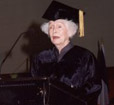 Thelma Raley, a resident of Winter Haven, Fla. and Blowing Rock, N.C., was a successful businesswoman, civic leader and pioneer in the Florida citrus industry. As the owner of Raley Grove Properties for more than 50 years, she was recognized as one of the top women citrus growers in the South.
Thelma Raley, a resident of Winter Haven, Fla. and Blowing Rock, N.C., was a successful businesswoman, civic leader and pioneer in the Florida citrus industry. As the owner of Raley Grove Properties for more than 50 years, she was recognized as one of the top women citrus growers in the South.
Raley graduated from Messer Business College and attended Florida State College for Women (now Florida State University). A mother of three, she realized a lifelong ambition when she completed her studies and received a Bachelor's degree in English from Appalachian in December 1992 at the age of 80. She made a substantial financial commitment to the Walker College of Business.
